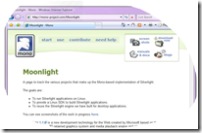Silverlight / Moonlight - Innovation and Interop
Last week Microsoft announced that Silverlight 1.0 was being released.  For those of you who may not be aware of what Silverlight is, you should go check it out at Microsoft.com. To quote the marketing pitch - Silverlight is, "a cross-browser, cross-platform plug-in for delivering richer user experiences on the web."
For those of you who may not be aware of what Silverlight is, you should go check it out at Microsoft.com. To quote the marketing pitch - Silverlight is, "a cross-browser, cross-platform plug-in for delivering richer user experiences on the web."
In other words, think kick-butt graphics, video, and audio for websites and/or web-based applications. The dev team did a bunch of work to make the use of Silverlight by other  developers easy, fast, and powerful. If you want to get a feel for what is possible with the tool, look at the "Whirlything." While I don't know that I would classify the Whirlything as the coolest thing since sliced bread, it sure helped me understand how tools like this can start to influence user interfaces. So, from a tech perspective Silverlight has some depth and power and for consumers it will add to the progression of what is possible for new applications.
developers easy, fast, and powerful. If you want to get a feel for what is possible with the tool, look at the "Whirlything." While I don't know that I would classify the Whirlything as the coolest thing since sliced bread, it sure helped me understand how tools like this can start to influence user interfaces. So, from a tech perspective Silverlight has some depth and power and for consumers it will add to the progression of what is possible for new applications.
But, I'm a nerd in that I don't focus on the "wow" factor of this stuff from the tech front. I have a different take on it.
As you may have noticed, my blog has been rather myopic on Open XML of late. That is fine given the intensity of that issue, but it is by no means my only focus. Interoperability remains my top-level focus, and standards are only way of many to get there.
Silverlight is interesting to me in that it deals with the spectrum of elements that foster interoperability. The one that I will focus on here is the  business relationship with Novell. In case you did not see this in the release, Microsoft is also going to work with Novell on a project called "Moonlight" which is the idea of Silverlight on Linux.
business relationship with Novell. In case you did not see this in the release, Microsoft is also going to work with Novell on a project called "Moonlight" which is the idea of Silverlight on Linux.
Why is this interesting to me? Because at the heart of Silverlight is the desire to drive innovation forward. Yes, there is competition with Flash - and that pushes both technologies forward. But success for innovators is in seeing adoption, and hopefully having that positively affect their business overall.
X-plat is all about interoperability. And here we see a case where the building of the bridge between the two platforms (Windows and Linux) is important and significantly driven through the business relationship between two firms. That relationship addresses both technology and business requirements (business including legal considerations as well).
My point is that the interoperability users will ultimately experience will not have come from a standard . It will come from the idea that innovation is driving forward the technology, and the businesses involved are finding ways to achieve interoperability via implementations, business arrangements, and IP agreements. It is too easy to fall into the myopia of interop=open standards. Real-world interop is going to come by keeping the full spectrum of possibilities in mind.
Silverlight is really cool stuff, and this announcement absolutely highlights the thinking behind our Interoperability By Design approach. 
Comments
Anonymous
September 09, 2007
PingBack from http://msdnrss.thecoderblogs.com/2007/09/09/silverlight-moonlight-innovation-and-interop/Anonymous
September 23, 2007
Matusow said: My point is that the interoperability users will ultimately experience will not have come from a standard . You are right. It comes from the documented formats. Like, TCP/IP, ODF, Kerberos.. etc etc or from reverse engineered formats (see SAMBA, OpenOffice MS .doc) It will come from the idea that innovation is driving forward the technology, you are right... if it is based on documented formats, protocols.. In the MS case, this is far from the reality. and the businesses involved are finding ways to achieve interoperability via implementations, translation: we (MS) will decide who will get info HOW to implement certain format and protocol. business arrangements, and IP agreements. translation: see above It is too easy to fall into the myopia of interop=open standards. This is pure crapola. Mr. Matusow. What do you think, _why is the TCP/IP protocol used/implemented all around the world ? Because of business arrangements and IP arrangements between parties ? Wrong, mr. Matusow, very wrong !!! Because of well documented protocol, is the answer. In my book, this is called real interoperability. Real-world interop is going to come by keeping the full spectrum of possibilities in mind. As usual, you are right again... if the formats, protocol are documented and available to the public for free. Of course, this is not true for MS. Puzzle for you: Why ALL UNIX variant (including Linux) can share their file systems with each other regardless of the vendor (AIX, HPUX, Solaris, Irix, BSD, Linux... and... surprise surprise even MS Windows) ? scroll down .. answer: because SUN published well documented NFS standard for free many many years ago. Even MS benefited from it. This is the real meaning of interoperability